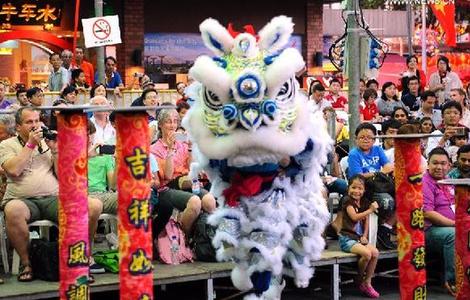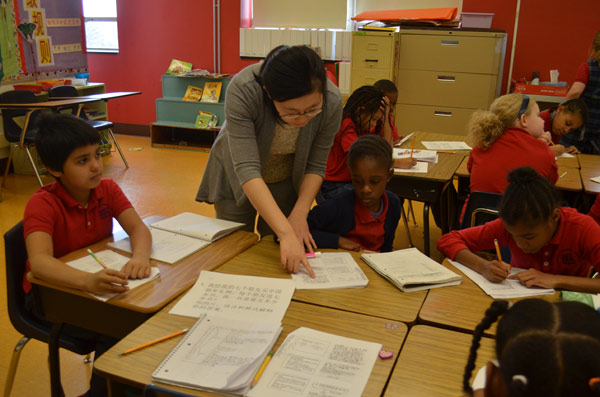Start it early, start it full
Updated: 2015-02-20 10:49
By Cai Chunying(China Daily USA)
|
||||||||
Why Chinese immersion?
Myriam Met helped to launch the program at Potomac Elementary School while serving as coordinator of foreign language for Montgomery County Public School in Maryland. Being very much involved in Spanish and French immersion programs in other districts before, Met applied for a similar one in Asian languages upon learning the US government has grants to encourage such projects.
"It is up to the school and parents' choice to select which Asian language to study and they picked Chinese for they think it is the language of 21st century," said Met who later became the acting director of National Foreign Language Center and a sought-after expert in the immersion field.
The program proved to be very popular among parents so the county, answering a parents' petition, started another one at College Garden Elementary School in 2005.
Washington's Yu Ying school, however, did not start its immersion program with such ease.
When Mary Shaffner's daughter reached near-school age in DC, she found no school offered a Chinese-language learning class, so she gathered support from 10 like-minded parents, who all have personal connections with China, to launch a public charter Chinese immersion school from scratch, which is open to all children in the city.
Shaffner, who studied Chinese and lived in China for a while, still remembers when the school petition reached the city's public charter school board's hearing in 2007 after an onerous preparation process.
"They looked at me and said, `Who wants to learn Chinese anyway?'" Schaffer recalled. "About 100 parents in the audience, all dressed in Yu Ying T-shirts, stood up and said 'We do'." The school was soon approved. Today it has become one of the "hottest" schools in DC.
Shaffner along with others launched a new middle and high school - District of Columbia International School - in 2014 so Yu Ying students can continue learning Chinese there upon graduation.
A beneficiary
Kona-Facia Nepay, founder of Baltimore International Academy (BIA) has a similar story. She herself is a beneficiary of a language immersion program. Nepay learned her French in immersion style in her native country Liberia, and the experience was so amazing to her that she later finished her graduate studies in France specializing in immersion teaching.
When she moved to Baltimore, Nepay wanted her son to study French but found no school offered it. Nepay and her husband gathered support from other parents and started BIA in 2007, offering four languages-Chinese, Spanish, French and Russian. The school added Arabic in last fall, becoming the only one in the nation offering immersion in five languages.
Nepay said Chinese immersion programs in the US have grown so rapidly that they have almost become "vogue". "It's now everywhere," she said. In recent years, BIA has had twice many applicants that it could accept for its Chinese immersion program.
For parents, believing in the power of foreign language and the advantage their children can gain in the global job market often plays a major role in their decision to choose Chinese immersion.
"Going to an early language immersion program gives them the opportunity to use the part of the brain that they otherwise will not use until later in life," said Miranda, the mother of Aniya.
Miranda said it was Aniya's father's decision to pick Chinese because he saw China as a rising power and has been seeing the need for people who can speak Chinese and the growth of Chinese language in the US.
Performance speaks
Even though in Chinese immersion classes many curricular subjects are taught in Chinese, students still need to take standard tests in English on various subjects set by the states.
For outsiders and new parents, it is often hard to imagine that an English-speaking student could master a subject that is taught in another language.
Research, however, has shown that students can indeed learn concepts in one language and then utilize them in another. A test score is one of the best proofs. According to Elizabeth Weise, author of A Parent's Guide to Mandarin Immersion, presumably the most resourceful book in the field, current data show that Chinese immersion students not only score as good as their peers in a regular English track, they often excel.
Interviews with administrators and teachers in the greater Washington area involved in Chinese immersion programs also suggest that this outcome is universal among their students.
"It is common for students to lag a bit behind their peers for the first a couple of years while they are grasping the basic concepts of language and subjects. They, however, do catch up steadily and often surpass their peers in later years, rather noticeably," said Zhian Zhang, Chinese immersion program director at Potomac Elementary School, which has both English-track class and Chinese immersion class throughout K-5 levels.
Research shows that immersing in a foreign language stimulates the brain, improves attention, enhances self control and the ability to deal with complex information, leading to better academic performance.
But Myriam Met, the immersion expert, believes the main reason may be teaching.
"In order for an immersion teacher to be effective with students learning the language, they have to use a lot of teaching strategies that I think in the long run are simply good teaching," said Met.
Airry Zhang, Chinese immersion program director at BIA who also teaches kindergarten, agrees. She said their teachers have to work particularly hard to convert the required concepts and skills in the common English curriculum to Chinese and then search for the best way to teach it. Jingmei Shi, an assistant teacher in Zhang's class and a former university teacher in China, believes that the enthusiasm she has seen among her students is mainly due to how they are taught the language and content.
Nepay, founder of BIA, praised the nine teachers in her Chinese immersion program as extremely committed. "We found the culture of Chinese people lend themselves to hard work and commitment. Our colleagues in Chinese immersion program are very cohesive, cooperative. They are team players. They always do things together and they do it so excellently," she said.

 Tibetans rejoice at twin New Year celebration
Tibetans rejoice at twin New Year celebration
 Across America over the week (from Feb 13 to 19)
Across America over the week (from Feb 13 to 19)
 Chinese in the South remembered
Chinese in the South remembered
 Ringing in Chinese New Year on the Nasdaq
Ringing in Chinese New Year on the Nasdaq
 Spring Festival greetings from the ambassadors
Spring Festival greetings from the ambassadors
 Las Vegas lights up for Lunar New Year
Las Vegas lights up for Lunar New Year
 Spring Festival fireworks in New York City
Spring Festival fireworks in New York City
 Going abroad for Lunar New Year
Going abroad for Lunar New Year
Most Viewed
Editor's Picks

|

|

|

|

|

|
Today's Top News
Chinese students, faculty to study at Missouri university
Phillips Academy Andover to deepen China ties
Chinese in the South remembered
California port chief upbeat on agreement to end dock strike
NBA China CEO sees the sport proliferate
China tilts to Kabul with US pullout
No letup seen for business travel
Chinese visitors set to celebrate New Year worldwide
US Weekly

|

|








